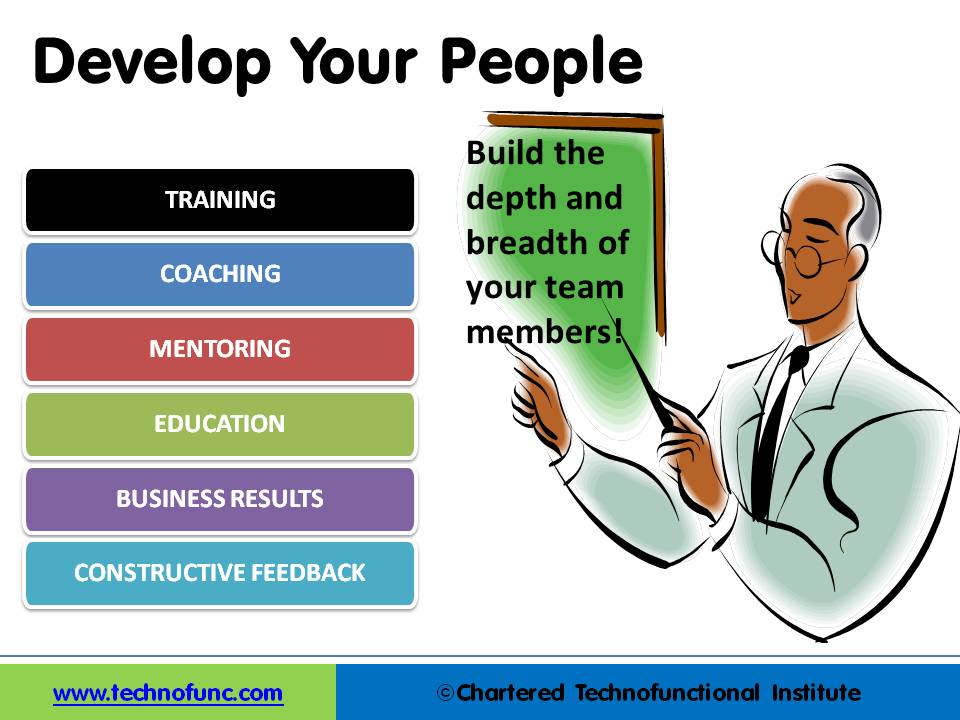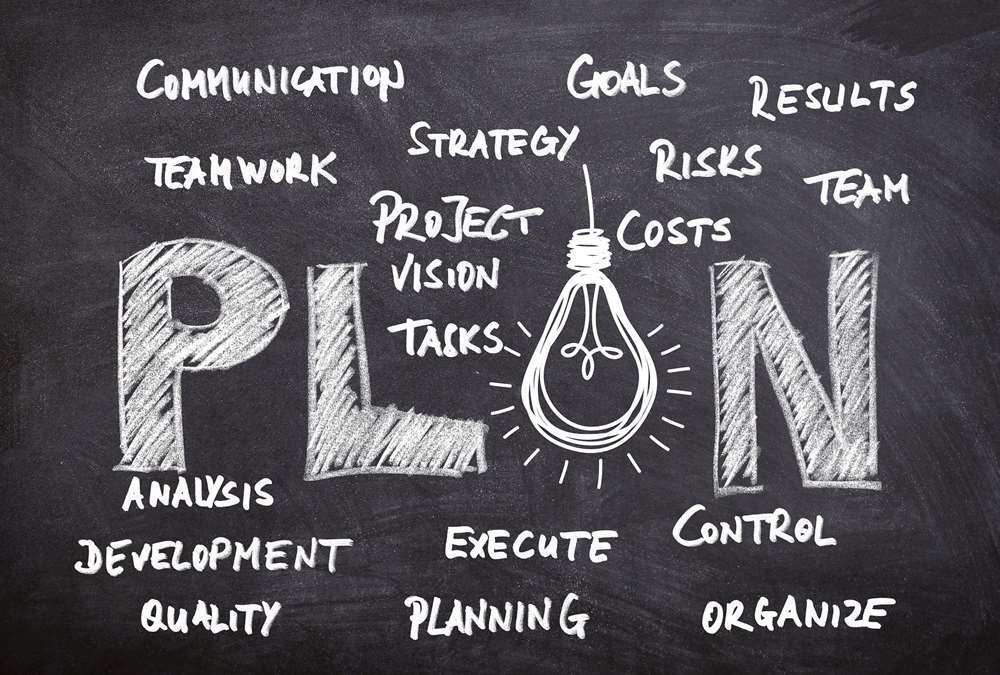- Home
- Business Processes
- Industry Knowledge
- Aerospace Industry
- Automotive Industry
- Banking Domain
- BFSI Industry
- Consumer/ FMCG Industry
- Chemicals Industry
- Engineering & Construction
- Energy Industry
- Education Domain
- Finance Domain
- Hospitality Domain
- Healthcare Industry
- Insurance Domain
- Retail Industry
- Travel and Tourism Domain
- Telecom Industry
- Leadership Skills
- eLearning
- Home
- Leadership
- Decision Making
- Tools for Developing Your Team
Tools for Developing Your Team
If a manager has too many weak spots in the talent of the team, the ability to empower the team members to independently execute the project is impaired. Assignments fall behind schedule or stretch out because the needed skills or knowledge are not in place when needed. To successfully execute important projects, hiring talented people, and increasing the talents of existing staff are most important.
Continuous Development of the Team
Continued focus on the development of the team helps to put the manager in a position to pursue important assignments and build the confidence that the team is prepared for the task at hand. Your confidence on your people is the key to empower people. Learning culture is an environment that supports an open mindset, an independent quest for knowledge, and embraces shared learning directed toward the mission and goals of the organization. Companies with continuous learning cultures enjoy a number of benefits, including:
- They are 46 percent more likely to be first to market
- They experience 37 percent higher productivity
- They are 92 percent more likely to innovate
Importance of Training & Coaching
Creating depth requires a commitment to growing people. The manager cannot wave a magic wand and all of a sudden get high-performance. You need to develop your team using different techniques like training, mentoring and coaching and formal education. There is a much-underused resource company can leverage to complete their transition toward a continuous learning culture: peer coaching. If implemented correctly, a continuous learning culture based on peer coaching can drive performance, boost employee engagement, and develop future leaders.
Take Every Assignment as a Learning Opportunity
This depth of professionals comes about by seeing every project or assignment as having learning opportunities within. Projects and tasks provide a platform to do the work and grow at the same time. By building well-trained people, you have automatic trainers within the team. Mentors are created on their own. Once your people develop and grow, empowering them becomes easy. The rapid change in business and organizations means everyone needs to constantly be learning. More and more people are looking for options on their own because they aren’t getting what they need from their employers.

Understand the Big Picture
Once empowered, to make the right decisions, people must understand how the company generates money, what the expenses are, and how it makes a profit. To achieve this, share the key financial data and provide meaningful explanations of these figures. Show people how their jobs are tied to these results and how empowered performance can have a positive impact on the numbers. Team leaders should help their direct reports connect their learning goals to wider company objectives and ensure that team members have the time and resources they need to reach their goals. Start building your team’s business process understanding by leveraging technofunc’s functional training. Whether the learner is a team leader or team member, or both, they will learn how to be effective team players and team leaders, solve problems, and work towards common goals via highly interactive case studies, exercises, and use of TechnoFunc resources.
Feedback is Important
The ability to give effective feedback is a powerful skill, yet it is underdeveloped in new managers. Giving effective feedback involves a combination of several key skills that managers need — the ability to observe, communicate, and listen. Helping future leaders develop those skills early on will ensure they are prepared to coach their teams. Provide frequent feedback so that people know how they are doing. Apart from rewards and recognition, people deserve your constructive feedback so that they can continue to develop their knowledge and skills.
Explore Technofunc Toolkit for Team Development
Technofunc resources aim at bridging the gap between technical and functional expertise and have invested a lot of effort into creating tutorials on various business processes and industry knowledge. Our curriculum is designed to equip a person to leverage technology as well as learn critical business application processes along-with system integrity and security, systems audit, project management, and other key methods widely used today that helps in the integration of business processes and practices in tune with the requirements that are driven both by business, globalization and legislature. We can help your team gain expertise in both technical and functional skills, which when applied collectively comprise of professional competence and excellence.
Given below are the different technofunc resources to start building your skills:
Build Domain Skills
- Aerospace Domain
- Automotive Domain
- Banking Domain
- BFSI Domain
- Consumer / FMCG Domain
- Chemicals Domain
- Engineering and Construction Domain
- Energy Domain
- Education Domain
- Financial Management & Business Dynamics
- Global Markets Domain
- Hospitality and Leisure Domain
- Healthcare Domain
- Insurance Domain
- Technology Domain
- Retail Domain
- Travel Domain
- Telecom Domain
“The difference between great people and everyone else is that great people create their lives actively, while everyone else is created by their lives, passively waiting to see where life takes them next. The difference between the two is the difference between living fully and just existing.”
- Michael E. Gerber
Related Links
You May Also Like
-
A manager or an employee in an organization who is experiencing a high level of stress may develop high blood pressure, ulcers, irritability, difficulty in making routine decisions, loss of appetite, accident proneness, and the like. These can be subsumed under three general categories, physiological, psychological, and behavioral symptoms. Stress can give rise to a number of changes.
-
Evidence of the medically damaging symptoms of work stress necessitates applying the treatment of stress management. Stress management is increasingly drawing the attention to the management experts not only as a remedial measure but also as a way to resource management. If the workplace can be made a little more lovable the increase in the achievement of the organization may be much time more. If group stress can be removed by introducing group discussions and recreational facilities a long-lasting team spirit may get developed.
-
Authentic leadership is an approach to leadership that emphasizes building the leader's legitimacy through honest relationships with followers which value their input and are built on an ethical foundation. The authentic leader acts upon his or her values and beliefs, and inspires others to do the same, is committed to know and develop oneself. Are you committed to developing yourself; know your motivations and the purpose of your leadership? Read this article to know more about authentic leadership style and discovering your authentic self.
-
Understanding Corporate Strategy
Management outlook and procedures have been revolutionized by more and more innovations over the recent years. It is no longer possible to follow traditional approaches to develop your organization's direction, its management as well its effectiveness. Senior managers need to be good decision-makers. In this section, we introduce concepts for strategy, strategic planning, strategic leadership, their exact meaning and associated terms, and how to use them.
-
Recognizing Stress & its Sources
As an individual, you almost certainly know what stress feels like. Stressors are events or situations to which people must adjust. Stressors may be physical or psychological in nature. The level of severity of stress is determined not merely by exposure but the intensity, duration, and frequency of stressors. The sources of stress are many. They arise from multiple areas both with the individual and from the environment.
-
Navigating your career journey will hopefully include a series of experiences that challenge your skills and abilities in ways that are satisfying and rewarding. Only you can manage your career. That means you must determine what things you are passionate about, what your goals are, both professionally and personally, and how much energy you are willing to invest along the way. Learn how to build an effective career path framework for yourself.
-
Develop your Leadership Skills
There are a number of broad skill areas that are particularly important for leaders. Today's demanding global business landscape is defined by relentless change and rising business complexity, bringing new challenges. Leadership skills provide career-enhancing resources and support you to be exceptionally successful in your career. Leaders need to provide direction to their teams and need to be able to make good and timely decisions to define and support strategic direction for the enterprise.
-
Emergent leadership occurs when a group member is not appointed or elected as leader, but rather that person steps up as the leader over time within-group interactions. Have you ever faced challenges in getting accepted into your new role of position as a leader? Groups don't automatically accept a new "boss" as a leader. Emergent leadership is what you must do when taking over a new group. Learn more about emergent leadership.
-
At different points in your professional career, it is helpful to identify your core values. Values are the qualities considered to be the most important guiding principles that determine the priorities in your life and greatly influence your career choices. Your career brings happiness when it is in agreement with the beliefs you have about what is important and meaningful to you. Awareness of your values will help you develop a clearer sense of what's most important to you in life.
-
Guide to Technical Leadership Skills
Technical leaders care about building amazing products and the best technical capabilities in their teams. Everything they do is focused on improving the user experience and bringing competitive advantage for their organization. Learn the skills and competencies you need to build a technical career path for yourself that starts with building technical expertise and grows into developing technical leadership.
Explore Our Free Training Articles or
Sign Up to Start With Our eLearning Courses

About Us
Learning
© 2023 TechnoFunc, All Rights Reserved










